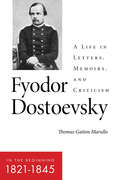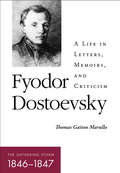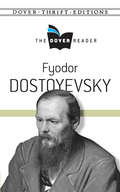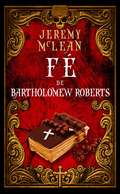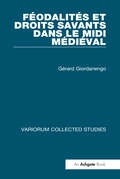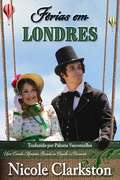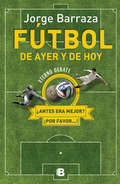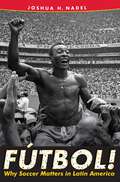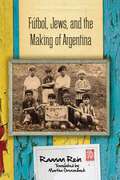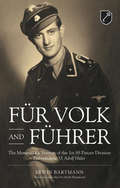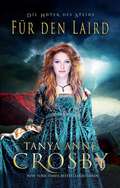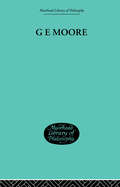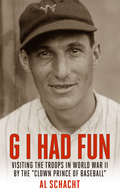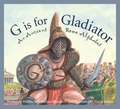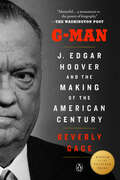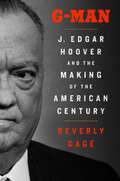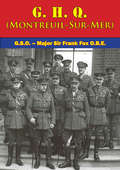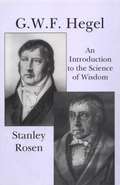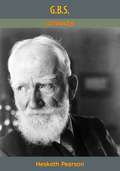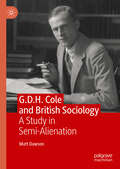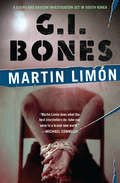- Table View
- List View
Fyodor Dostoevsky—In the Beginning: A Life in Letters, Memoirs, and Criticism (NIU Series in Slavic, East European, and Eurasian Studies)
by Thomas MarulloMore than a century after his death in 1881, Fyodor Dostoevsky continues to fascinate readers and reviewers. Countless studies of his writing have been published—more than a dozen in the past few years alone. In this important new work, Thomas Marullo provides a diary-portrait of Dostoevsky's early years drawn from the letters, memoirs, and criticism of the writer, as well as from the testimony and witness of family and friends, readers and reviewers, and observers and participants in his life. Marullo's exhaustive search of published materials on Dostoevsky sheds light on many unexplored corners of Dostoevsky's childhood, adolescence, and youth. Speakers of excerpts are given maximum freedom: Anything they said about the writer—the good and the bad, the truth and the lies—are included, with extensive footnotes providing correctives, counter-arguments, and other pertinent information. The first part of this volume, "All in the Family," focuses on Dostoevsky's early formation and schooling, i.e., his time in city and country, and his ties to his family, particularly his parents. The second section, "To Petersburg!," features Dostoevsky's early days in Russia's imperial city, his years at the Main Engineering Academy, and the death of his father. The third part, "Darkness before Dawn," deals with the writer's youthful struggles and strivings, culminating in the success of his work, Poor Folk. This clear and comprehensive portrait of one of the world's greatest writers will appeal to students, teachers, and scholars of Dostoevsky's early life, as well as general readers interested in Dostoevsky, literature, and history.
Fyodor Dostoevsky—The Gathering Storm: A Life in Letters, Memoirs, and Criticism (NIU Series in Slavic, East European, and Eurasian Studies)
by Thomas Gaiton MarulloThis second book in a three-volume work on the young Fyodor Dostoevsky is a diary-portrait of his early years drawn from letters, memoirs, and criticism of the writer, as well as from the testimony and witness of family and friends, readers and reviewers, and observers and participants in his life. The result of an exhaustive search of published materials on Dostoevsky, this volume sheds crucial light on the many unexplored corners of Dostoevsky's life in the time between the success of his first novel, Poor Folk, and the failure of his next four works. <P><P>Thomas Gaiton Marullo lets the original writers speak for themselves—the good and the bad, the truth and the lies—and adds extensive notes with correctives, counterarguments, and other pertinent information.Marullo looks closely at Dostoevsky's increasingly tense ties with Vissarion Belinsky, Nikolai Nekrasov, Ivan Turgenev, and other figures of the Russian literary world. He then turns to the individuals who afforded Dostoevsky security and peace amid the often negative reception from fellow writers and readers of his early fiction. Finally, Marullo shows us Dostoevsky's break with the Belinsky circle; his struggle to stay afloat emotionally and financially; and his determination to succeed as a writer while staying true to his vision, most notably, his insights into human psychology that would become a hallmark of his later fiction. This clear and comprehensive portrait of one of the world's greatest writers provides a window into his younger years in a way no other biography has to date.
Fyodor Dostoyevsky The Dover Reader (Dover Thrift Editions)
by Fyodor DostoyevskyNoted for his sympathetic portrayals of the downtrodden members of nineteenth-century Russian society, Fyodor Dostoyevsky (1821-1881) has exercised immense influence on modern writers. His fiction, rich in philosophical and psychological insights, anticipated the development of psychoanalysis and existentialism. This anthology offers an excellent introduction to Dostoyevsky as well as a portable collection for readers already acquainted with the Russian author's works.Three novellas appear here in their entirety: Poor Folk, The Double, and Notes from the Underground. An excerpt from Crime and Punishment provides a compelling sample of Dostoyevsky's masterwork, and short stories include "Another Man's Wife" and "White Nights."
Fé de Bartholomew Roberts
by Jeremy McLeanJohn Roberts luta com sua fé, pois é forçado a questionar o tratamento dos escravos e o fascínio da pirataria. O que faz um homem pecador? O que faz um homem um santo? Onde começa o bem e o mal começam? John Roberts considera-se um cristão, um homem religioso de Deus, mas quando sua fé é abalada, ele começa a questionar as regras bíblicas que ele representou durante toda a vida. A vida de Roberts em um navio escravo é cheia de trabalho duro, salários baixos e nenhuma chance de avanço. Quando Roberts se torna amigo de um escravo chamado Bartholomew, ele não podia saber que começaria uma série de eventos levando-o em sua primeira aventura marítima. Em uma época de piratas que não são escravos de ninguém, Roberts encontra-se dividido entre um mundo de homens justos e pecadores doentios por todos os cantos. O Roberts religioso se tornará um pecador ou permanecerá um santo durante seu teste bíblico de fé? Veja onde as provas de Roberts o levam em suas histórias curtas cheias de ação, aventura, piratas e corsários estabelecidos durante a Era de Ouro da pirataria.
Féodalités et droits savants dans le Midi Médiéval (Variorum Collected Studies)
by Gérard GiordanengoThe feudal system has come to be seen as one of the most characteristic features of the Western Middle Ages, yet the study of feudal law has not always received the same attention as that given to its institutions. This law, it is true, was a subject of secondary importance in the medieval universities, but there does remain a corpus of writing sufficiently large to permit the investigation of how it related to medieval practice. In these articles, now provided with extensive additional notes, Gérard Giordanengo has undertaken such an investigation, with particular reference to Southern France in the 12th-14th centuries. He shows how, in Provence, legal doctrine did exert a clear influence on feudal practice, and that it was the jurists attached to princely or ecclesiastic entourages who were the key to its dissemination. In the Dauphiné, on the other hand, theory had a more limited impact, and feudal ties became not a mark of subjection, but a means of recognising legal and social status. At the governmental level, finally, he argues that it was not any feudal theory, nor even any feudal structures, but rather the absolutist doctrines of Roman law and the Old Testament that shaped the political ideology - and practice, if possible - of the medieval king. Le système féodal est considéré comme étant l’une des caractéristiques fondamentales du Moyen Age occidental; cependant, l’étude du droit féodal savant n’a pas toujours fait l’objet de la même attention que celle portée à ses institutions et coutumes. Ce droit, il est vrai, était un sujet d’importance secondaire au sein des universités médiévales, mais il reste néanmoins, un ensemble d’écrits suffisamment important pour qu’il soit possible d’examiner son influence sur la pratique médiévale. Au cours de ces articles, dès à présent pourvus de notes supplémentaires, Gérard Giordanengo a entrepris une telle analyse, se référant plus particulièrement au Sud de l
Férias em Londres: Uma Comédia Romântica Baseada em Orgulho e Preconceito
by Nicole ClarkstonTraído e drogado em sua própria casa, Fitzwilliam Darcy foge de um acordo forjado que o levaria a um casamento infeliz. Vestido como um criado, ele é recebido em um dos bairros desconhecidos de Londres por uma jovem que está com pressa e sem tempo, correndo para salvar sua vida. Decidindo se esconder à vista de todos, a Srta. Elizabeth Bennet evita a expectativa de se casar com o homem dos sonhos de sua mãe. Quando o lacaio insolente que ela “encontrou” se recusa a sair de seu lado até que eles possam descobrir uma solução para seus respectivos dilemas, os dois novos conhecidos se dão férias, experimentando o melhor que a Regência Inglesa tem a oferecer. Baseado em Orgulho e Preconceito de Jane Austen, dois personagens obstinados com corações bondosos podem descobrir a verdade por trás do disfarce? Desfrute da brincadeira, do humor e do afeto crescente enquanto o Sr. Darcy e a Srta. Elizabeth têm o melhor dia de suas vidas e descubra que eles podem encontrar o amor e o romance durante as férias em Londres. Este livro é apropriado para todas as idades.
Fútbol de ayer y de hoy
by Jorge BarrazaJorge Barraza, uno de los mejores cronistas deportivos, habla con glorias del fútbol para comparar el fútbol de ayer con el de hoy. Jorge Barraza, uno de los cronistas de fútbol más importantes de América Latina escribe este fascinante libro sobre el deporte más popular del mundo. Acudiendo a testimonios de futbolistas y técnicos como Bielsa, Menotti, Maturana, Ángel Cappa, entre otros, reflexiona sobre una debilidad humana: la de sentir y creer que todo tiempo pasado fue mejor. Que por supuesto no es así. Todas las épocas tienen maravillas y mamarrachos. Pero en fútbol esa tendencia a adorar el pasado se acrecienta como en ninguna otra actividad: siempre, lo mejor, fue lo de antes.
Fútbol!: Why Soccer Matters in Latin America
by Joshua H. NadelGet ready for the 2014 FIFA World Cup and the 2016 Summer Olympics—both held in Brazil—with the story of Latin America’s most popular sport. Fútbol! explains why competitors and fans alike are so fiercely dedicated to soccer throughout the region.From its origins in British boarding schools in the late 1800s, soccer spread across the globe to become a part of everyday life in Latin America—and part of the region’s most compelling national narratives. This book illustrates that soccer has the powerful ability to forge national unity by appealing to people across traditional social boundaries. In fact, author Joshua Nadel reveals that what started as a simple game played a seriously important role in the development of Latin American countries in the twentieth century. Examining the impact of the sport in Argentina, Honduras, Brazil, Uruguay, Paraguay, Chile, and Mexico, Nadel addresses how soccer affects politics, the media, race relations, and gender stereotypes.With inspiring personal stories and a sweeping historical backdrop, Fútbol! shows that soccer continues to be tied to regional identity throughout Central and South America today. People live for it—and sometimes kill for it. It is a source of hope and a reason for suicide. It is a way out of poverty for a select few and an intangible escape for millions more.
Fútbol, Jews, and the Making of Argentina
by Raanan Rein translated by Martha GrenzebackIf you attend a soccer match in Buenos Aires of the local Atlanta Athletic Club, you will likely hear the rival teams chanting anti-Semitic slogans. This is because the neighborhood of Villa Crespo has long been considered a Jewish district, and its soccer team, Club Atlético Atlanta, has served as an avenue of integration into Argentine culture. Through the lens of this neighborhood institution, Raanan Rein offers an absorbing social history of Jews in Latin America. Since the Second World War, there has been a conspicuous Jewish presence among the fans, administrators and presidents of the Atlanta soccer club. For the first immigrant generation, belonging to this club was a way of becoming Argentines. For the next generation, it was a way of maintaining ethnic Jewish identity. Now, it is nothing less than family tradition for third generation Jewish Argentines to support Atlanta. The soccer club has also constituted one of the few spaces where both Jews and non-Jews, affiliated Jews and non-affiliated Jews, Zionists and non-Zionists, have interacted. The result has been an active shaping of the local culture by Jewish Latin Americans to their own purposes. Offering a rare window into the rich culture of everyday life in the city of Buenos Aires created by Jewish immigrants and their descendants, Fútbol, Jews, and the Making of Argentina represents a pioneering study of the intersection between soccer, ethnicity, and identity in Latin America and makes a major contribution to Jewish History, Latin American History, and Sports History.
Für Volk and Führer: The Memoir of a Veteran of the 1st SS Panzer Division Leibstandarte SS Adolf Hitler
by Erwin Bartmann Derik HammondOne German soldier’s experience in the deadly crucible of World War II combat. Like many Germans, Berlin schoolboy Erwin Bartmann fell under the spell of the Zeitgeist cultivated by the Nazis. Convinced he was growing up in the best country in the world, he dreamt of joining the Leibstandarte, Hitler’s elite Waffen SS unit. Erwin fulfilled his dream on May Day 1941, when he walked into the Lichterfelde barracks in Berlin as a raw recruit. On arrival at the Eastern Front in late summer 1941, Erwin was assigned to a frontline communications squad. When the end of the Reich became inevitable, Erwin was forced to choose between a struggle for personal survival and the fulfillment of his SS oath of “loyalty unto death.” From the war on the southern sector of the Eastern Front to a bomb-shattered Berlin populated largely by old men and demoralized women, this candid eyewitness account offers a unique and sometimes surprising perspective on the life of a young Leibstandarte SS Adolf Hitler volunteer. “A valuable memoir, providing both a good account of the changing attitudes of the author, both towards the Nazi regime and the chances of final victory.” —History of War
Für den Laird
by Tanya Anne Crosby Angelika DürreJeder ist seines Glückes Schmied. Keane ist der letzte männliche Erbe des dún Scoti-Clans, deshalb ist seine Zukunft seit der Stunde seiner Geburt vorbestimmt. Eines Tages muss er den Platz seines Bruders als Hüter des Schicksalssteins einnehmen. Ein Sturm zieht auf. Die unbeständigen Highland-Winde ändern wieder ihre Richtung. Um einen drohenden Aufstand zu verhindern, befiehlt König David von Schottland die Hochzeit einer Enkelin von MacBeth mit dem neuen Laird von Moray, von dem es heißt, er sei so gefährlich und hinterhältig wie sein Vater. Ein schicksalhafter Kuss. Als Lianae von Moray Schutz bei Keane dún Scoti sucht, ist der letzte Prinz der Pikten bereit, für einen heimlichen Kuss und die Chance auf ein eigenes Lehen, seiner Familie und Heimat den Rücken zu kehren – und so das Schicksal zu erfüllen, das nur die alte Seherin voraussagen konnte… Reich an Geschichte und Legenden setzt FÜR DEN LAIRD die Erzählung fort, die mit HIGHLAND FIRE begann und mit SCHWERT DES KÖNIGS weiterging. Dies ist der dritte Band der Reihe Die Hüter des Steins.
Für immer mein Schurke
by Amanda MarielEin Schurke, der nicht ignoriert werden kann … Lady Annabelle Lindlow hegt große Hoffnungen, dass die Magie des Rosenquarzes sie zu ihrer wahren Liebe führen wird. Bis der Stein sie den Weg eines bekannten Lebemanns kreuzen lässt, des Duke of Rutland. Überzeugt davon, dass der Quarz nicht meinen kann, dass sie sich in einen berüchtigten Schurken verliebt, verwirft sie den Gedanken und richtet ihr Augenmerk woanders hin. Doch als sich Annie erneut in nächster Nähe des Herzogs befindet, ist sie gezwungen, es sich noch einmal zu überlegen. Vielleicht weiß der Stein es am besten? Eine viel zu verlockende Dame … Evan Colborne, der Duke of Rutland, ist von Lady Annabelle Lindlow bezaubert. Die bemerkenswerte Schönheit mit der schlagfertigen Zunge könnte perfekt zu ihm passen. Zu schade, dass die Lady sich seinem Charme widersetzt. Nachdem eine Reihe von Ereignissen ihn ihren Weg kreuzen lässt und es unmöglich macht, ihn zu ignorieren, kommt sie bereitwillig in seine Arme. Und Evan schwört, sie niemals gehen zu lassen. Eine Prüfung wahrer Liebe … Als Lady Annabelle und der Duke of Rutland ihre Gefühle annehmen, kommt es zur Katastrophe. Kann wahre Liebe triumphieren? Oder war die Partie zum Scheitern verurteilt?
G E Moore: Essays in Retrospect
by Morris LazerowitzThis is Volume III of twenty-two volumes on 20th Century Philosophy. Originally published in 1970, this is a collection of essays of George Edward Moore (1873-1958) who was one of the most influential philosophers of the twentieth century, and the outcome of the changes he introduced into our ways of thinking in philosophy cannot yet be foreseen.
G I Had Fun
by Al SchachtG I Had Fun, first published in 1945, is the inspiring World War Two account by major-league baseball player and coach Al Schacht. Schacht, known as the “Clown Prince of Baseball” for his hilarious antics, entertained thousands of troops in North Africa, Sicily, and the South Pacific on several USO tours. As the book’s jacket states, G I Had Fun is written “not as a comic trying to put over a gag, but as a humble human being who has been deeply moved by what he has seen. There is a depth of sincerity and feeling, as well as humor, that is wholly honest.” To the GI far from home, his efforts were much enjoyed and appreciated, and an important boost to the men’s morale. Schacht would later open a popular restaurant in New York City and sometimes perform his comedy routines for his guests. He passed away in 1984.
G Is for Georgia
by Christopher RobbinsA is for Atlanta B is for Blue Ridge Mountains C is for Civil War With F for the Atlanta Falcons, J for Jekyll Island, and P for Georgia peach, going from A to Z has never been more fun! Take an alphabetized field trip around the Peach State and discover the plants, animals, foods, and places that make it, well, Georgia!
G Is for Gladiator: An Ancient Rome Alphabet
by Michael Shoulders Debbie ShouldersReaders are given an A-Z introduction to ancient Rome, including its social, political, and civil customs and practices. Explores topics such as Roman law, architecture, mythology, etc.
G Is for Granite: A New Hampshire Alphabet
by Marie HarrisDiscover New Hampshire and its rich heritage, unique natural history, and groundbreaking citizens.
G-Man (Pulitzer Prize Winner): J. Edgar Hoover and the Making of the American Century
by Beverly GageWinner of the 2023 Pulitzer Prize in BiographyWinner of the 2022 National Book Critics Circle Award in Biography, the 2023 Bancroft Prize in American History and Diplomacy, and the 43rd LA Times Book Prize in Biography | Finalist for the 2023 PEN/Jacqueline Bograd Weld Award for BiographyNamed a Best Book of 2022 by The Atlantic, The Washington Post and Smithsonian Magazine and a New York Times Top 100 Notable Books of 2022 &“Masterful…This book is an enduring, formidable accomplishment, a monument to the power of biography [that] now becomes the definitive work&”—The Washington Post&“A nuanced portrait in a league with the best of Ron Chernow and David McCullough.&”—The Wall Street JournalA major new biography of J Edgar Hoover that draws from never-before-seen sources to create a groundbreaking portrait of a colossus who dominated half a century of American history and planted the seeds for much of today's conservative political landscape.We remember him as a bulldog--squat frame, bulging wide-set eyes, fearsome jowls--but in 1924, when he became director of the FBI, he had been the trim, dazzling wunderkind of the administrative state, buzzing with energy and big ideas for reform. He transformed a failing law-enforcement backwater, riddled with scandal, into a modern machine. He believed in the power of the federal government to do great things for the nation and its citizens. He also believed that certain people--many of them communists or racial minorities or both-- did not deserve to be included in that American project. Hoover rose to power and then stayed there, decade after decade, using the tools of state to create a personal fiefdom unrivaled in U.S. history. Beverly Gage&’s monumental work explores the full sweep of Hoover&’s life and career, from his birth in 1895 to a modest Washington civil-service family through his death in 1972. In her nuanced and definitive portrait, Gage shows how Hoover was more than a one-dimensional tyrant and schemer who strong-armed the rest of the country into submission. As FBI director from 1924 through his death in 1972, he was a confidant, counselor, and adversary to eight U.S. presidents, four Republicans and four Democrats. Franklin Roosevelt and Lyndon Johnson did the most to empower him, yet his closest friend among the eight was fellow anticommunist warrior Richard Nixon. Hoover was not above blackmail and intimidation, but he also embodied conservative values ranging from anticommunism to white supremacy to a crusading and politicized interpretation of Christianity. This garnered him the admiration of millions of Americans. He stayed in office for so long because many people, from the highest reaches of government down to the grassroots, wanted him there and supported what he was doing, thus creating the template that the political right has followed to transform its party.G-Man places Hoover back where he once stood in American political history--not at the fringes, but at the center--and uses his story to explain the trajectories of governance, policing, race, ideology, political culture, and federal power as they evolved over the course of the 20th century.
G-Man: J. Edgar Hoover and the Making of the American Century
by Beverly GageWhen he became director of the FBI in 1924, J. Edgar Hoover was a dazzling wunderkind buzzing with big ideas for reform. He transformed a failing law-enforcement backwater, riddled with scandal, into a modern machine. He believed in the power of the federal government to do great things for the nation and its citizens. He also believed that certain people – many of them communists or racial minorities – did not deserve to be included in that American project. In her nuanced and definitive portrait, Beverly Gage charts Hoover&’s rise to power, as he used the tools of state to create a personal fiefdom unrivalled in U.S. history. Hoover was not above blackmail and intimidation, and his conservative values ranged from white supremacy to a crusading and politicized interpretation of Christianity. But he was more than a one-dimensional tyrant who strong-armed the country into submission. As FBI director for almost fifty years, he was a confidant, counsellor, and adversary to eight U.S. presidents, four Republicans and four Democrats. His conservative values won him the admiration of millions of Americans. He stayed in office for so long because many people, from the highest reaches of government down to the grassroots, wanted him there. And he has done more to shape the political right today than many presidents. G-Man places Hoover back where he once stood: at the centre of American political history. In telling his story, Gage shines a light on great social and political changes in 20th century America, from policing and civil rights to political culture and ideology.
G. H. Q. (Montreuil-Sur-Mer) [Illustrated Edition]
by G.S.O. – Major Sir Frank Fox O.B.E.Includes the First World War Illustrations Pack - 73 battle plans and diagrams and 198 photosAccount of the work at G.H.Q. by an officer (Australian Sir Frank Fox) who served there attached to the Quartermaster-General's Branch. "His account of the conditions in which a junior administrative staff officer lived & worked is valuable, especially as there are few records of this sort." - Falls
G. W. F. Hegel: An Introduction To The Science Of Wisdom
by Stanley RosenG.W.F. Hegel: An Introduction to the Science of Wisdom
G.B.S.: A Postscript
by Hesketh PearsonThis book, first published in 1951, is a Postscript to Bernard Shaw: His Life and Personality—Hesketh Pearson’s biography of Bernard Shaw, published in 1942, which became the standard work on Bernard Shaw. It was unique among other books on the same subject because Shaw himself gave every possible help to his biographer, allowing him to quote whatever he wished from published and unpublished correspondence. Shaw answered every question put to him and willingly revealed a great deal of information about his own life that had not been available hitherto.G.B.S. A Postscript continues the story from the point at which the biography left off. It describes the intimate discussions and not infrequent but always friendly disagreements which took place while it was bring written.Hesketh Pearson was in constant touch with Shaw throughout the last decade of his life, and, with Shaw’s knowledge, kept the biography up to date, noting down immediately after their occurrence accounts of their many discussions. Shaw subsequently recalled many things about his past which had previously escaped him, and so many fresh sidelights on Shaw and his contemporaries are included here. Not the least illuminating feature of this book is the obituary which Shaw himself contributed.
G.D.H. Cole and British Sociology: A Study in Semi-Alienation
by Matt DawsonThis book explores G.D.H Cole’s significant yet often overlooked role in the history of British Sociology from 1920-1960. Eager to achieve a sense of scientific legitimacy following its institutionalisation in the early 1900s, British sociology had no space for a scholar like Cole, who saw sociology as an innately normative and political project which, in his case, was dedicated to the development of socialism. Conceptualising Cole's relationship to sociology as one of semi-alienation - suggesting an openness to the principles of the discipline yet disagreement with the form it takes in the current day - Dawson shows how Cole made a number of important sociological contributions which were grounded in an early form of structuration theory, including the production of one of Britain’s first sociology textbooks and an early monograph on the sociology of class. A passionate advocate for what sociology could be, Cole was a promoter of the sociological Marx and interrogator of Durkheim as part of his desire to develop sociology in Britain, including at his own institute of the University of Oxford. Cole also produced a distinctive corpus of public and creative sociology expressed in newspaper articles, poems and songs. Drawing on archival research Dawson reintegrates Cole into the history of British Sociology, and in so doing offers valuable insight into sociology's history and its contemporary form, emphasising a normative, critical and public form of the discipline.
G.I. Bones (George Sueño and Ernie Bascom #6)
by Martin LimónPraise for the Sueño and Bascom series: "Setting the standard for military crime fiction, Limón's compelling stories of murder, greed, and abuse of power are set off by the Korean culture and 1970s atmosphere."--Library Journal, starred review "Altogether engaging."--The Washington Post Book World "Combining the grim routine of a modern police procedural with the cliff-hanging action of a thriller movie."--The Wall Street Journal "It's great to have these two mavericks back."--The New York Times Book Review "Easily the best military mysteries in print today."--Lee Child "Martin Limón does what the best storytellers do: take you away to a brand new world."--Michael Connelly A Korean fortune-teller is being bothered by a dead American soldier who wants his bones found and buried. An underage officer's daughter is missing together with a Latino soldier. Several of the leading Korean gangsters who own the bars in the ville have been killed. Sueño and Bascom of Military Intelligence must go back to the founding of Itaewon, Seoul's red-light district, in order to learn who killed the soldier, who's taking revenge on the gang lords, and where to find the missing girl. Martin Limón is the author of numerous stories about his army police duo as well as five previous novels, Jade Lady Burning (a New York Times Notable Book of the Year), Slicky Boys, Buddha's Money, The Door to Bitterness, and The Wandering Ghost, all available from Soho Crime. He lives near Seattle. From the Hardcover edition.
G.I. Dogs: Judy, Prisoner of War (G. I. Dogs Ser. #1)
by Laurie CalkhovenMeet Judy: an English Pointer and member of her Majesty's Royal Navy who served bravely alongside her crew during World War II. When her ship was sunk by the enemy, Judy became the only canine prisoner of war of the Japanese. Join Judy on her incredible journey from puppy to soldier to POW as she narrates her story of survival and heroism. This "dog's-eye view" takes readers into the heart of the naval action of WWII and will leave you cheering for Judy and her human companions as they overcome countless obstacles and prove time and again why a dog really is man's best friend.
